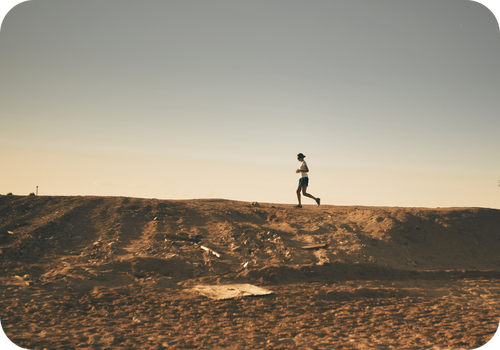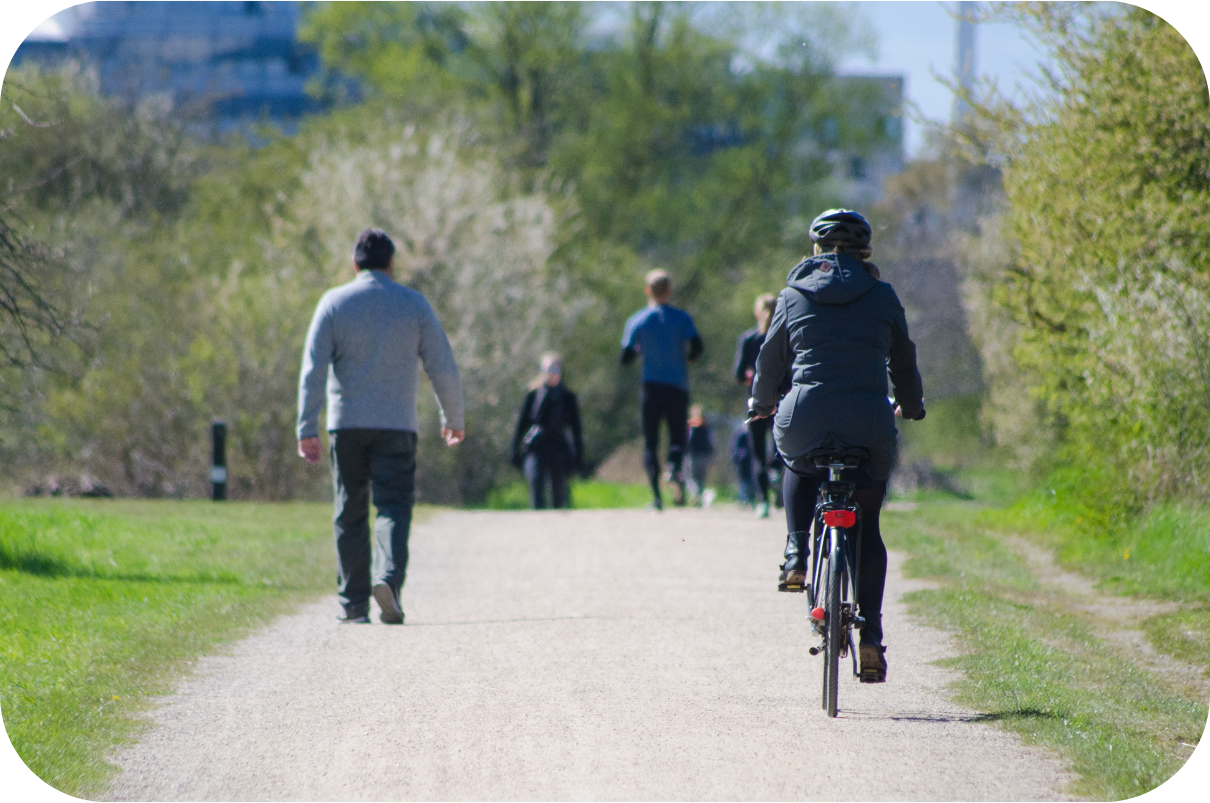Home > Living Well with Dementia > Staying Physically Active

Staying Physically Active
Living with dementia does not mean individuals have to discontinue the activities they enjoy. On the contrary, being physically active and engaging in recreational activities can help individuals with dementia improve their mental well-being, maintain their physical fitness, and enhance their overall quality of life.[1]
Physical activities, including aerobic exercise (e.g., running) and resistance training (e.g., resistance band exercises), can help maintain physical fitness and promote a more regular daily routine. Individuals with dementia can also participate in household chores as another form of physical activity.
In addition to physical activities, engaging in recreational activities, especially those in group settings, also promotes cognitive health and enhances social well-being.[2]
Individuals at different stages of dementia have unique needs and abilities. It is important to identify activities that they are interested in which are suitable for their physical and cognitive ability.


Staying Physically Active
Living with dementia does not mean individuals have to discontinue the activities they enjoy. On the contrary, being physically active and engaging in recreational activities can help individuals with dementia improve their mental well-being, maintain their physical fitness, and enhance their overall quality of life.[1]
Physical activities, including aerobic exercise (e.g., running) and resistance training (e.g., resistance band exercises), can help maintain physical fitness and promote a more regular daily routine. Individuals with dementia can also participate in household chores as another form of physical activity.
In addition to physical activities, engaging in recreational activities, especially those in group settings, also promotes cognitive health and enhances social well-being.[2]
Individuals at different stages of dementia have unique needs and abilities. It is important to identify activities that they are interested in which are suitable for their physical and cognitive ability.
Below are some examples of activities for individuals at different stages of dementia:

Activities for Individuals with Mild Dementia
Although individuals with mild dementia may experience difficulty recalling recent events or handling complex tasks, they still maintain a significant degree of independence and cognitive function.
As such, it is important for them to stay physically and socially active, as this can help preserve motor skills and slow cognitive decline. At this stage, caregivers can provide verbal encouragement, reminders, and minimal assistance to encourage individuals to enjoy activities independently that align with their interests.

Activities for Individuals with Moderate Dementia
Individuals with moderate dementia may encounter challenges with multi-step tasks and require more assistance and supervision.
It can be helpful to focus on activities that are simpler and do not require complex cognitive skills. This approach aims to help them find enjoyment in activities, minimize frustration, and enhance overall well-being.
Activities for Individuals with Severe Dementia
Individuals with severe dementia experience significant cognitive and mobility impairment and lose the ability to communicate.
Activities at this stage should emphasize providing comfort and maintaining their dignity and quality of life.
Caregivers can encourage them to do simple activities that stimulate the five senses – sight, smell, touch, taste, and sound.

Useful Resources
Find more examples of physical and recreational activities:
- Yee Hong Centre: Online Dementia Hub – Together!
- University of Waterloo: Resources about Physical Activity and Dementia
- Dementia-Inclusive Choices for Exercise: Resources for People Living with Dementia, Family & Friends
- Alzheimer Scotland: Activities – A guide for carers of people with dementia
- DREAM: Physical Activity
- Elderly Health Service, Department of Health, The Government of the HKSAR: Dementia – Selecting suitable activities
- Hong Kong Alzheimer’s Disease Association: What are the 6 arts (Chinese)
- DREAM: Strategies for physical activities
- DREAM: Assess Physical Activity Safety
Find more online activities and mobile apps:
Learn more about activities for individuals with severe dementia
- Yee Hong Centre: Online Dementia Hub – Non-pharmacological intervention
- Social Care Institute for Excellence: Activity in the later stages of dementia
- Mountain-Pacific Quality Health: Using the Five Senses to Support Residents with Dementia
- Lok Sin Tong Chan Lai Jeong Kiu Neighbourhood Elderly Centre, Hong Kong: “More Care at Home” caregiver training for dementia III: Home training for people with late-stage dementia (video in Cantonese)
References
[1] Sampaio, A., Marques-Aleixo, I., Seabra, A., Mota, J., & Carvalho, J. (2021). Physical exercise for individuals with dementia: potential benefits perceived by formal caregivers. BMC Geriatrics, 21(1), 6–6. https://doi.org/10.1186/s12877-020-01938-5
[2] Vedel, I., Sheets, D., McAiney, C., Clare, L., Brodaty, H., Mann, J., Anderson, N., Liu‐Ambrose, T., Rojas‐Rozo, L., Loftus, L., Gauthier, S., & Sivananthan, S. (2020). CCCDTD5: Individual and community‐based psychosocial and other non‐pharmacological interventions to support persons living with dementia and their caregivers. Alzheimer’s & Dementia : Translational Research & Clinical Interventions, 6(1), e12086–n/a. https://doi.org/10.1002/trc2.12086
[3] National Health Service, the United Kingdom. (2021). Activities for dementia. https://www.nhs.uk/conditions/dementia/living-with-dementia/activities/
[4] Mountain-Pacific Quality Health. (n.d.). Using the Five Senses to Support Residents with Dementia. https://www.mpqhf.org/QIO/wp-content/uploads/2016/03/508_Five-Senses-and-Dementia.pdf
[5] Alzheimer’s Foundation of America. (n.d.). Therapeutic Activities for 3 Main Stages of Alzheimer’s disease. https://alzfdn.org/therapeutic-activities-for-3-main-stages-of-alzheimers-disease/
Below are some examples of activities for individuals at different stages of dementia:

Activities for Individuals with Mild Dementia
Although individuals with mild dementia may experience difficulty recalling recent events or handling complex tasks, they still maintain a significant degree of independence and cognitive function.
As such, it is important for them to stay physically and socially active, as this can help preserve motor skills and slow cognitive decline. At this stage, caregivers can provide verbal encouragement, reminders, and minimal assistance to encourage individuals to enjoy activities independently that align with their interests.

Activities for Individuals with Moderate Dementia
Individuals with moderate dementia may encounter challenges with multi-step tasks and require more assistance and supervision.
It can be helpful to focus on activities that are simpler and do not require complex cognitive skills. This approach aims to help them find enjoyment in activities, minimize frustration, and enhance overall well-being.

Activities for Individuals with Severe Dementia
Individuals with severe dementia experience significant cognitive and mobility impairment and lose the ability to communicate.
Activities at this stage should emphasize providing comfort and maintaining their dignity and quality of life.
Caregivers can encourage them to do simple activities that stimulate the five senses – sight, smell, touch, taste, and sound.
Useful Resources
Find more examples of physical and recreational activities:
- Yee Hong Centre: Online Dementia Hub – Together!
- University of Waterloo: Resources about Physical Activity and Dementia
- Dementia-Inclusive Choices for Exercise: Resources for People Living with Dementia, Family & Friends
- Alzheimer Scotland: Activities – A guide for carers of people with dementia
- DREAM: Physical Activity
- Elderly Health Service, Department of Health, The Government of the HKSAR: Dementia – Selecting suitable activities
- Hong Kong Alzheimer’s Disease Association: What are the 6 arts (Chinese)
- DREAM: Strategies for physical activities
- DREAM: Assess Physical Activity Safety
Find more online activities and mobile apps:
Learn more about activities for individuals with severe dementia
- Yee Hong Centre: Online Dementia Hub – Non-pharmacological intervention
- Social Care Institute for Excellence: Activity in the later stages of dementia
- Mountain-Pacific Quality Health: Using the Five Senses to Support Residents with Dementia
- Lok Sin Tong Chan Lai Jeong Kiu Neighbourhood Elderly Centre, Hong Kong: “More Care at Home” caregiver training for dementia III: Home training for people with late-stage dementia (video in Cantonese)
References
[1] Sampaio, A., Marques-Aleixo, I., Seabra, A., Mota, J., & Carvalho, J. (2021). Physical exercise for individuals with dementia: potential benefits perceived by formal caregivers. BMC Geriatrics, 21(1), 6–6. https://doi.org/10.1186/s12877-020-01938-5
[2] Vedel, I., Sheets, D., McAiney, C., Clare, L., Brodaty, H., Mann, J., Anderson, N., Liu‐Ambrose, T., Rojas‐Rozo, L., Loftus, L., Gauthier, S., & Sivananthan, S. (2020). CCCDTD5: Individual and community‐based psychosocial and other non‐pharmacological interventions to support persons living with dementia and their caregivers. Alzheimer’s & Dementia : Translational Research & Clinical Interventions, 6(1), e12086–n/a. https://doi.org/10.1002/trc2.12086
[3] National Health Service, the United Kingdom. (2021). Activities for dementia. https://www.nhs.uk/conditions/dementia/living-with-dementia/activities/
[4] Mountain-Pacific Quality Health. (n.d.). Using the Five Senses to Support Residents with Dementia. https://www.mpqhf.org/QIO/wp-content/uploads/2016/03/508_Five-Senses-and-Dementia.pdf
[5] Alzheimer’s Foundation of America. (n.d.). Therapeutic Activities for 3 Main Stages of Alzheimer’s disease. https://alzfdn.org/therapeutic-activities-for-3-main-stages-of-alzheimers-disease/
